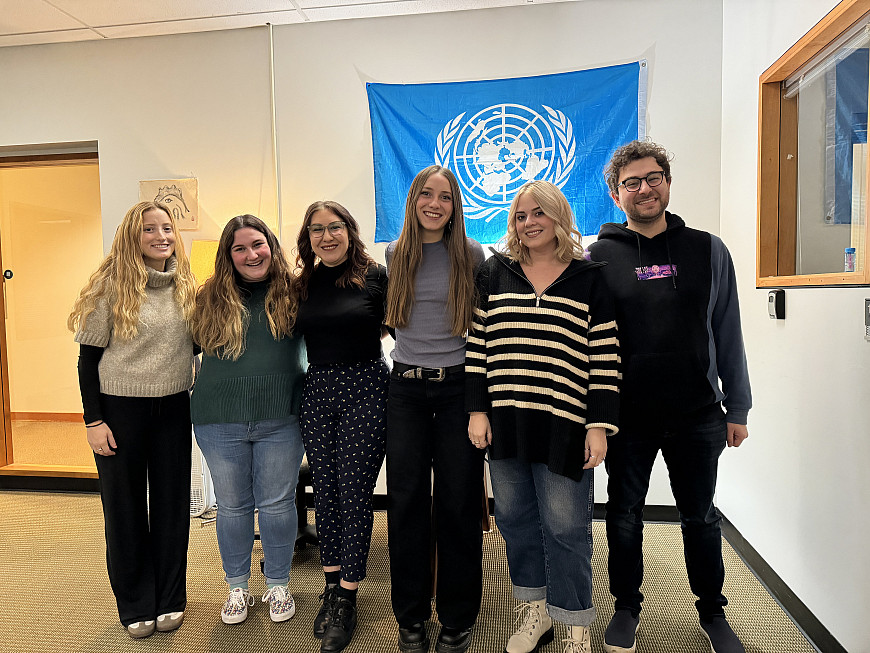Clinic Students Present Research on Global Plastics in White House Call
Global Law Alliance clinic students joined advocacy groups from across the country to urge U.S. negotiators to act aggressively within the scope of their authority as the Global Plastics Treaty negotiations begin to come to a close.

Last week, clinic students with Lewis & Clark Law School’s Global Law Alliance for Animals and the Environment (GLA) joined White House treaty negotiators and advocacy organizations on a call discussing the United States’ plans for moving forward with international negotiations for a treaty regulating the lifecycle of plastics. Clinic student and 2L Mikki Ness presented GLA’s research and analysis on the call with the aim of encouraging negotiators to take the strongest stance possible during the final negotiation sessions for the treaty.
In 2022, the United Nations Environment Assembly (UNEA) adopted Resolution 5/14 establishing a mandate to create an international legally binding instrument addressing the full lifecycle of plastics. Since then, negotiators and stakeholders from across the globe have met four times at Intergovernmental Negotiating Committee (INC) sessions to negotiate the content and text of the instrument. The prospective treaty stands to potentially regulate plastics from production through disposal and provide for capacity building, technology transfer, and a financial mechanism to assist developing countries.
Taking a strong stance in these negotiations is critical for both people and animals, and the environment on which we all depend. Plastics, by design, take centuries to degrade, meaning that most plastic ever produced continues to exist somewhere on earth, including in the least-explored depths of the sea to the highest mountains. No place on earth has escaped the wrath of plastic pollution. As plastics break down, the chemical components leach into water and soils, degrading habitat and affecting food chains. Moreover, microplastics can actually absorb other chemicals, which can have the effect of concentrating chemical pollution, risking even greater harm to both people and animals.
In preparation for the final treaty negotiating session beginning Nov. 25, U.S. negotiators from the White House, State Department, and numerous agencies such as the Environmental Protection Agency (EPA) and the Food & Drug Administration (FDA) invited stakeholders to discuss the Biden-Harris Administration’s plans for negotiating the final stage of the treaty. GLA students Abigail Dodd ’26, Fiona Thayer ’26, Kat Engelken ’26, Sarah Rae ’25, and Mikki Ness ’26, working under the supervision and with the guidance of GLA Director and Clinical Professor, Erica Lyman, joined representatives of organizations such as the World Wildlife Fund (WWF), the Natural Resources Defense Council (NRDC), and Greenpeace in urging the United States to promote forward momentum in negotiations. Ness presented GLA’s work to negotiators on the call. During the call, the students worked together to adjust their intervention to be responsive to evolving dynamics and new information.
“It was a great experience to share everyone’s hard work and hear a range of perspectives from various stakeholders on a call like this,” said Ness. “I feel invigorated and look forward to seeing the impact our work will have as the negotiations continue.”
“Working with GLA has provided me the opportunity to develop essential practical skills and apply them in real-world, client-centered scenarios. Engaging with international clients is both rewarding and a powerful reminder of why I pursued environmental law at Lewis & Clark,” shared Dodd, another clinic 2L.
The Global Law Alliance at Lewis & Clark Law School is a champion for wild animals and wild spaces across the globe, working to protect animals and the environment through the development, implementation, and enforcement of international law. Law students (JD and LLM) actively participate in the work through two legal clinics. GLA was launched in 2020 as an innovative collaboration of the Center for Animal Law Studies and the Environmental Law Program at the law school. This year, GLA clinic students worked on a report authored by the United Nations Office on Drugs and Crime and a report analyzing the legal pathways to address the impacts of agricultural runoff on wetland health. In 2023, GLA students also supported Professor Lisa Benjamin on an international climate justice initiative advocating for state obligations on climate change.
Law Communications is located in room 304 of Legal Research Center (LRC) on the law Campus.
MSC: 51
email jasbury@lclark.edu
voice 503-768-6605
Cell: 626-676-7923
Assistant Dean,
Communications and External Relations, Law School
Judy Asbury
Law Communications
Lewis & Clark Law School
10101 S. Terwilliger Boulevard MSC 51
Portland OR 97219

